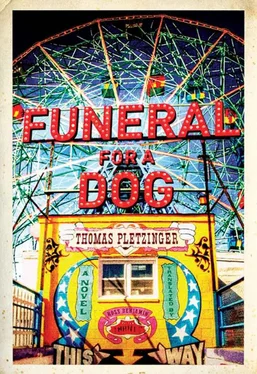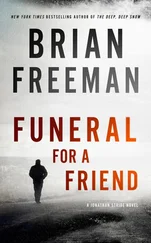no winner/no loser
But then Svensson serves too low and opens the third set with a net ball. He doesn’t know that he’s playing in the decisive round not only against the sun, but also against my hands’ memory (sharper slices, longer strokes, lower error rate). Ping-Pong is not a sport, said Elisabeth, seeming to doubt my masculinity, Ping-Pong is for school recess. Svensson and I stand opposite each other, our rallies get longer and fiercer. Now it’s about the game and no longer about politeness and my story (decision: I’m not giving up the lead again). I shift into a defensive position and let Svensson go at me. He serves to my backhand, and I return the ball with a sharp slice close over the net. At 19–19, when I just barely return one of his smashes and slip (I land on my knees), Svensson, completely unchallenged, smacks the ball into the net (he wanted to make it too good). Svensson stands there, inhales through his nostrils and lays his paddle on the table. Then he walks to the dock, takes off his shoes, and jumps without comment into the water (dramaturgy of people). Did Manteli win? the boy asks, and Tuuli says,
Svensson can’t win.
THESE DAYS, WAKING UP IN A PANIC IS THE RULE. THE DOUBLE plank-bed is screwed to the walls, the room is the exact length of the bed and less than twice as wide. Yesterday I fell asleep naked and I have now woken up under a wool blanket, the time in between has escaped me. Lua is snoring under the bed, and if Lua is snoring, I think, things must be all right. My new suit is hanging on the wall, next to it the room key with a heavy wooden tag: 219. The door is secured from the inside with a padlock. Little by little most of the details come back to me. Kiki Kaufman is asleep next to me, her camera is lying between us on the bed. The Bowery Whitehouse Hotel is not a hotel but a large loft with dark masked windows and tin ceiling tiles. This is where Hurstwood killed himself. The rooms are not rooms but wooden boxes, open on top, with latticework to keep out thieves. In the murky semidarkness I don’t know whether it’s day or night, I don’t have a watch, and I don’t have a headache yet from vodka, champagne, and wine. I told Kiki Kaufman half of the story, now she’s asleep. She’s thin, she has wrapped herself up to her neck in a white sheet, her black curls are spread out around her head like a pillow. Kiki Kaufman’s nose is covered with freckles. I remember West Broadway, Chinatown in the rain, the chickens on their hooks in the windows, the garbage cans, Kiki’s camera, Lua next to the black plastic bags. This city never sleeps, I think, the neon lights never go out. In one of the boxes someone screams, Kiki wakes up, we’re lying side by side. On the third floor of the Bowery Whitehouse Hotel we listen to things: footsteps on the worn-down carpet, the opening of beer cans, then a belch, the toilet at the end of the corridor, the groans of sad people in their boxes. I haven’t yet told Kiki that Tuuli had a boy, or that his name is Samuli, that the two of them are doing well, that I don’t know who the father is, that I hung up before Felix could say the name of the clinic. Samuli arrived two months early, I say, he was actually supposed to be born in Germany, now he’s an American. Kiki asks whether I’m a sort of uncle to him. After a while we hear a giggle outside our box, a rattle of keys. From 218 first the sound of a door closing, then the sound of greedy lips, two fast belt buckles, the squishing sound of the washable mattress. Six o’clock, Kiki whispers, welcome to the desert of the real. Then the tear of a wrapper and the snap of rubber. At least they’re using protection, says Kiki. A man is breathing loudly and clearly, and a woman’s voice directs, back, back, baby. Good. Kiki and I lie on our backs and watch the fan on the ceiling through the latticework. Next to our heads, the panting and smacking goes on for a while, then the two voices and bodies click into their unimaginative in-and-out automatism, the man’s voice sings a hymn, show me those tits, come on, show me those tits, and the woman fills the gaps with the mantra of these days, oh my God, oh my God, but her voice falters more confidently and skillfully than in the television images. Kiki and I don’t move on the rubber mattress, we wait in the groaning of the wooden walls, in the shaking of sleeping boxes 215 to 221, in the New York round of the last days and weeks. We’re not alone, we’re three, Tuuli said. We miscalculated. Kiki Kaufman, Lua, and I listen to 215 breathing, 216 dying, 217 asking for quiet. 221 is cooking packet soup on a gas cooker. We hear a lubricant tube and a lubricant squelch. When 218 then finishes loudly and clearly, Kiki Kaufman grabs a towel from the hook on the washable wall, takes a toothbrush out of a small bag, puts on underpants, a white T-shirt. Kiki walks barefoot out of the room, the last few days have to get washed off, she says. Lua sits up and asks me what we’re going to do now. I don’t know where to go, I answer, and a sign next to the door says DO NOT leave valuables in room , but Kiki has left us and the 219 key hanging here.
At ten, Lua, Kiki and I are leaning on the red fire-exit door and drinking vending machine coffee in the lobby. Today the sun is shining, Kiki is wearing a bright summer dress and taking pictures of the homeless people on the bench in front of the Whitehouse. A one-legged man is wearing the stars and stripes around his shoulders and playing a singing saw, he calls Lua his fellow veteran, he gives him a can of Yuengling Lager and puts down the saw on the linoleum when I can’t give him any change. Lua drinks silently, Kiki has brushed and petted him, he has said enough for the moment, and because a minute of silence with George Bush is broadcast on television, for a few seconds it’s unexpectedly quiet. The backpackers have disappeared, says the one-legged man, usually he lives off them. But then the first sirens are coming down the Bowery, the one-legged man picks up the saw again and plays “America the Beautiful,” because Kiki has found another dollar and wants to take pictures. Lua lies at her feet. I get us another coffee, and Kiki says I have to tell her more.
The night from the eleventh to the twelfth of September we spent in my bed, Tuuli slept badly and Lua snored. Eventually I was woken up by the sun or the traffic on the BQE and climbed up to the roof. A little later, Tuuli came up the fire escape and gave me a blanket. I gathered the bottles and cans as she sat in the sun. She had on the purple PricewaterhouseCoopers T-shirt again, I see clearly before my eyes the material stretching across her belly and the cracked white lettering across her breasts. I lay down next to her. It was cold, the tar paper smelled of beer. Lua whimpered down in the apartment, I remember the answering machine coming on. Someone was stuck at some airport and playing pool for money in a hotel lobby. My mother called, then Tuuli’s father, her mother, later the secretary of the Blaumeiser shipping company. In the first rays of sunlight we could see the gray houses of Williamsburg, farther away the brick buildings where the Latinos lived. Apart from the column of smoke, there wasn’t a cloud in the sky, in the low sunbeams the sycamores along the street seemed to be shining from within. Was she thirsty too, I asked. I don’t know, said Tuuli, and leaned toward me for a kiss. I taste like shit, I said to be safe, and she leaned back against the chimney. I closed my eyes and thought about nothing but the sun in my face, my headache, and Tuuli’s hand in mine. Down on the street Corner Store Oscar pulled up the metal shutters, put out the garbage, and hung an American flag in the window. And now? asked Tuuli, when Felix later came up to the roof and sat down next to us. You have tar-paper imprints on your face, said Felix, and when I replied that he should stop talking for a few minutes, please, Tuuli removed her hand from mine. Someone had to make coffee.
Читать дальше












